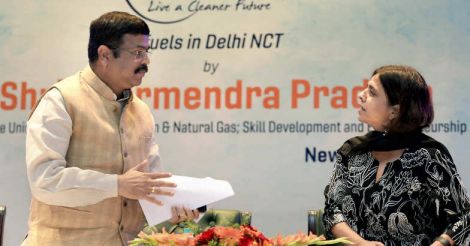New Delhi: World's cleanest petrol and diesel are now being supplied in Delhi after state-owned oil firms advanced rollout of Euro-VI grade fuel by two years in a bid to combat alarming levels of air pollution.
Since Sunday, Delhi has become the first city in the country to leapfrog from Euro-IV grade petrol and diesel to Euro-VI, which just contains 10 parts
per million (ppm) of sulphur as against 50 ppm in previous grade of fuel.
Speaking at an event to mark the occasion, oil minister Dharmendra Pradhan said the oil industry has shown its commitment to providing clean fuel and
now it is time for the automobile industry to also start introducing Euro-VI vehicles.
"Vehicle manufacturers in India are exporting Euro-VI vehicles to Europe. So they only have to change the driving seat and introduce the vehicles here,"
he said.
While vehicles in India have right-hand drive, Europe follows left-hand drive.
Pradhan said oil industry has invested Rs 30,000 crore in upgrading technology and processes to produce ultra-clean BS-VI petrol and diesel (equivalent
to fuel meeting Euro-VI emission norms) and would meet the April 2020 deadline for introducing such fuel all over the country.
Originally, Euro-V grade fuel was to be introduced from 2020 and Euro-VI from 2024. But the oil industry decided to skip Euro-V grade and advanced
Euro-VI rollout date to April 2020.
BS-1 grade petrol and diesel, introduced in 2000, contained 500 ppm and 1000 ppm of sulphur, respectively. Sulphur content has progressively been
reduced, he said adding the advancement of Euro-VI rollout has been done voluntarily, without any court instruction.
IOC chairman Sanjiv Singh said no country in the world has gone from Euro-IV to Euro-VI in three years. "This is the ultimate fuel. There is no better
fuel (than this) anywhere in the world now," he said.
While producing Euro-VI fuel came at a higher operating cost, the oil companies are not passing on the impact to consumers as of now, he said adding the
cost may be passed on when the whole country switches to Euro-VI in April 2020.
Cities in the national capital region like Noida, Ghaziabad, Gurugram and Faridabad as well as 13 major cities including Mumbai, Chennai, Bengaluru,
Hyderabad and Pune will switch over to Euro-VI grade fuel from January 1 next year. Rest of the country will follow suit from April 2020.
The cleaner fuel should cost around 50 paise a litre more.
To meet Delhi's annual consumption of 9.6 lakh tonne of petrol and 12.65 lakh tonne of diesel, Mathura refinery in Uttar Pradesh, Panipat refinery in
Haryana, Bina in Madhya Pradesh and Bhatinda in Punjab have started producing Euro-VI grade fuel. About Rs 183 crore has been spent on Panipat
refinery alone for producing cleaner fuel.
Other refineries are in the process of being upgraded, he said.
IOC, the nation's biggest oil firm controlling roughly half of retail fuel market, will source the BS-VI fuel to meet Delhi's requirement from its Mathura
and Panipat refineries, while Hindustan Petroleum Corp Ltd (HPCL) will do so from its joint venture refinery at Bhatinda. Bharat Petroleum Corp Ltd
(BPCL) will supply the fuel from its Bina refinery.
According to IOC, for petrol engines, one of the most critical specifications is Research Octane No. (RON), which has improved from 88 in BS-II to 91.
It is at par with regular 91 octane gasoline (petrol) required for Euro VI emission norms.
Sulphur specification for petrol and diesel will be reduced 50 times from a level of 500 ppm for BS-II fuel to 10 ppm in BS-VI.
Previously, the fuels meeting Bharat Stage (BS)-IV specifications were to be supplied throughout the country by April 2017 and BS-V fuel by April 1,
2020. But now the government plans to switch over directly from BS-IV to BS-VI auto fuels.
Oil refineries had previously upgraded technology and invested over Rs 55,000 crore for production and supply of BS-III/IV fuels. Oil refineries will
need to invest Rs 30,000 crore in upgrading petrol and diesel quality to meet cleaner fuel specifications by 2020.

























 Union petroleum minister Dharmendra Pradhan speaks with environmentalist Sunita Narain during an event to announce and introduce BS VI fuels in Delhi NCT in New Delhi on Monday. PTI
Union petroleum minister Dharmendra Pradhan speaks with environmentalist Sunita Narain during an event to announce and introduce BS VI fuels in Delhi NCT in New Delhi on Monday. PTI